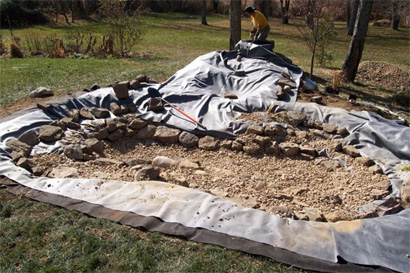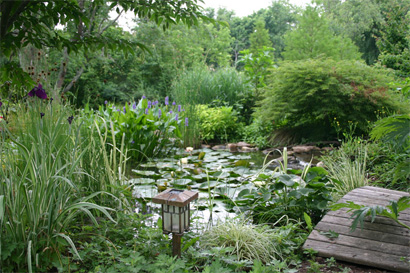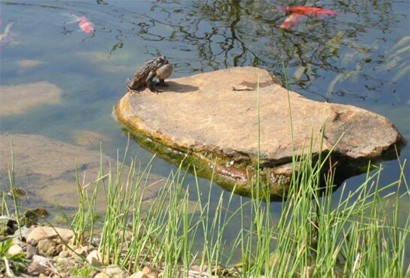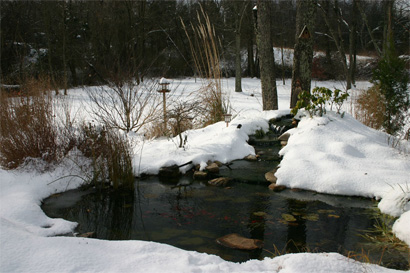Wildlife week continues! My humble experience with my own gardens past and present, as well as our campus garden, is that the presence of water virtually guarantees the presence of wildlife. One of the National Wildlife Federation’s top requirements for becoming a Certified Wildlife Habitat is “supply water” (another requirement: "$20 fee"). Water is, of course, the beverage of choice for most animals (though I did hear of a squirrel that preferred beer). And some creatures require it as a substrate in which to reproduce (that sounded a bit clinical). Unfortunately, the popularity of water gardening, according to garden trend surveys and such, peaked in the late 1990’s and has decreased since. I’d imagine this goes hand in hand with the desire for “no maintenance” landscapes. Whatever. I will not have a garden without moving water in it.

Our first pond-building experience. Dig 11′ x 16 hole with concentric steps. Place excess soil behind pond to create stream/falls/unintended volcano. Line, add river stone and gravel. Add water and LOTS of plants to disguise said volcano.

Voila.
True story that has nothing to do with wildlife*: We put this house up for sale one spring when the garden was kickin’. Within 10 minutes of the Realtor putting the sign out front, a truck drove up. The couple walked straight to the pond (at this point outfitted with a spiffy patio) and said "We’ll take it." I said "don’t you want to see the inside of the house?" and the young woman responded "Sure, I guess we need to." Sold it at 99% of asking price. Never underestimate the value of landscaping!!!
Back on topic…The sound of moving water is an essential part of the experience for me. Makes pulling weeds in the vicinity almost pleasant. Fish, tadpoles, snails, and salamanders populate our wee pond.

"Burrdurrrrp."
Watching the birds bath on the shallow gravel beach is delightful. The pump runs all winter, keeping the water moving and mostly open. I’m pretty sure that in the dead of winter, it’s the only unfrozen water source for quite a distance, judging from the multitude of critter tracks in the snow.

Water makes a garden more pleasant, adds value to our home, and increases the odds of survival for the wildlife during the toughest times of drought and cold. Now get digging.
*Actually, there was a wildlife-related incident…when the buyer’s Realtor took them down the exterior steps to inspect the cellar, he reached inside the door and put his hand on a 5′ long black snake wrapped around the light switch. That was almost a deal-breaker. Point being…if you create a wildlife-friendly yard, they will come. All of them.
It’s just lovely, Holly! We finished putting in
our pond this year. We have a tiny yard, so it has a tiny pond. But the birds love to bathe in the streambed, we had a nesting pair of ducks this spring, wasps perch on the stones and drink…I agree. Never will we live somewhere without moving water.
What about the animals known as mosquitos… any problems?
I agree with you about the sound of running water being essential but the wildlife it entices can be a problem. Some years ago I put in a small, preformed pond that morphed into a larger hand dug pond with small waterfall that morphed into a pond that flows into a stream and under a deck with a much larger waterfall. I had to replace the smaller stacked rock waterfall with boulders to keep the raccoons from rearranging them every single night. Some of these changes have come about because I just love the sound and sight of the water but many (most) of them have come about to battle the destructive critters – raccoons mostly and herons. I swear my raccoons are going for a degree in pond architecture as they regularly dig up plants in and near the pond, tear apart the liner and rearrange rocks. I might find them more amusing if they didn’t regularly leave their dropping directly under the swing set, and if I hadn’t had to pay for surgery when they took a dislike to the meekest of my cats…
Three cheers for water!
Water question for my tiny garden wildlife – soil microbes: Is municipal, chlorinated water detrimental to soil life in a garden?
Like Linda said, even a little pond can make a difference. JD, the goldfish eat the mosquito larvae. Kandi, that’s unfortunate (but a hoot) about your raccoons. Regarding herons, someday I may tell the story of my shoestring tackle… Daniel, if I’m not mistaken, that was discussed in a recent post. Maybe Linda remembers. Anyhoo, chlorine volatilizes fairly rapidly. Not rapidly enough to use it for a substantial water change in a pond without treatment.
I am a bit of a lunatic for ponds, with five in the garden, the largest about 1500 square feet. Chipmunks seem to favor the cool voids between boulders at the water’s edge, with garter snakes and frogs in the damper crevices. Every other creature imaginable visits regularly, thus far without a problem. No bears yet, nor lions or tigers. Herons have been the only issue we’ve encountered, snatching the koi and goldfish from the smaller ponds. Now, all fish are in the large pond that is deeper, and with vertical side walls the herons have been thwarted.
Four years ago, we bought a house with an old farmer’s canal running through the back yard. The water doesn’t run year round, only from April 1 through October 15 or so, but we get all sorts of wildlife year round. This summer, three mallards raised their babies in the canal so we were on cute overload for months. We also get wood ducks in the spring, but so far they haven’t used the wood duck box we put up (flickers use it in the winter for shelter). A bird bath is still needed for songbirds since the canal is too deep for them. The most unusual animal we’ve gotten is a yellow-bellied marmot. Too many of our neighbors overuse chemicals, so no frogs and we haven’t seen any other amphibians or reptiles. All this wildlife and we’re a 45 minute walk from the state capitol building!
How do you keep the fish from eating the amphibian eggs?
As a professional West Nile educator, let me answer the mosquito question this way: A well-maintained pond, stocked with fish, or with a fountain that continuously breaks up the surface of the water, is rarely, if ever, a mosquito problem. However, an abandoned, or unmaintained pond, allowed to dry up and refill, or one that stagnates and goes anaerobic, is a potentially serious problem. In the housing downturn recently, mosquito abatement has been a drain on public resources having to respond to unsold or foreclosed homes with abandoned ornamental ponds, or pools, because of the potential health risk. So, check to ensure compliance with any standing water ordinances that may apply in your area.
And for those of us with a “small garden” (1500 sqaure feet for moi), even the simplest water sources drawn in life: I have a vanishign fountain and a birdbath which has a heater in it come winter. Of course, your pond is kickin’ it whacked out hard, yo.